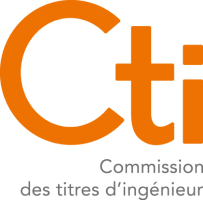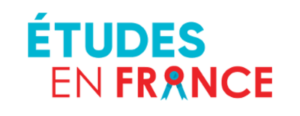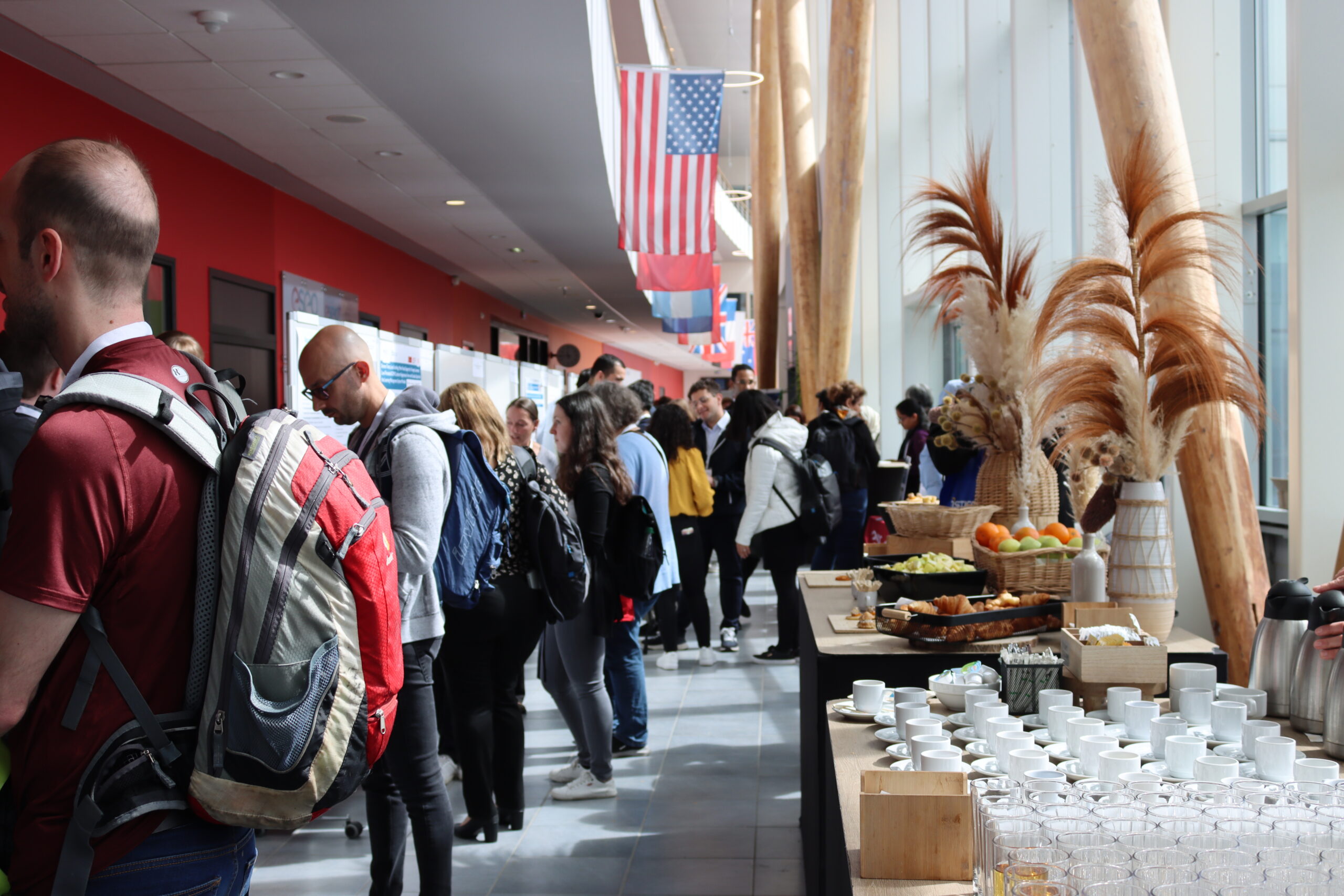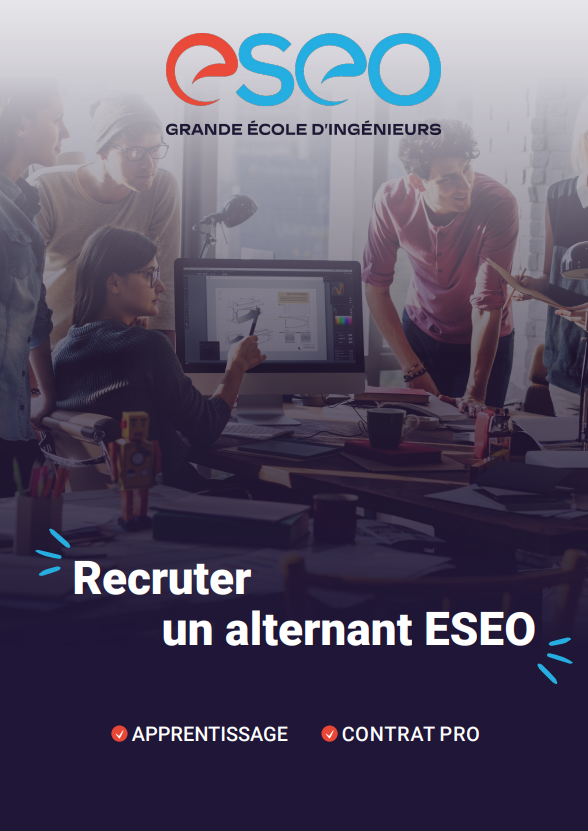
ESEO engineering course by apprenticeship
Change the world, become an engineer
The ESEO engineering cycle trains generalist engineers in New Technologies who master both IT and electronics, offering great versatility for careers in all sectors.
During the 3-year engineering cycle, ESEO students choose the training path that suits them best and gradually build the professional project that motivates them.
- Duration : 3 years
- Campus : Angers, Dijon, Paris-Vélizy
- Prerequisites: Bac +2/3 scientific and/or technical
- Tuition : Paid for by the company
- Programme
- Work-study
- Personalised support
- Target professions
- Benefits
- Admission procedures
Programme
The engineering apprenticeship at ESEO is designed to provide a comprehensive
experience, enabling you to acquire the technical and human skills needed to excel as an electronics and IT engineer.
The programme takes place over three years, alternating between the school and the company, and is offered on one of ESEO's three campuses.
A solid common base
80% of the course consists of a common core covering science, information technology, management, communication, human and social sciences, French and foreign languages.
This core enables ESEO apprentices to master the technical and managerial dimensions required to manage complex industrial projects. It is structured into six semesters as follows:
- Semesters 1 to 3: Common Core. The first three semesters form a solid core curriculum, covering the fundamentals of electronics, electrical engineering, automation, signal processing, mathematics, computer science, English, communication and project management. This core curriculum is designed to provide a robust technical and theoretical foundation while developing the project management skills that are essential for any engineer.
- Semesters 4 and 5: Further study. The following two semesters enable students to study one of the following areas in greater depth:
- Computing and information systems
- Embedded software and cybersecurity
- Electronics and connected objects
Apprentices here focus on advanced technological areas, in line with current market needs and emerging industry trends.
- Semester 6: Human Sciences and Management. The final semester focuses on the human sciences, with courses in management and innovation management, to prepare students for managerial responsibilities and strategic decision-making in their future careers.
Soft skills and socio-ecological awareness
ESEO places great importance on soft skills and values such as professional ethics, commitment, autonomy and communication. These skills, which are particularly in demand in companies, enable engineers to stand out in both their professional and personal lives.
In addition, our programme includes an awareness of socio-ecological impacts, preparing our students to become responsible engineers who are aware of contemporary issues.
Recognised and accredited
ESEO is a leading engineering school recognised by the CTI (Commission des titres d’ingénieurs) for its expertise in new technologies, particularly digital and electronics. This recognition guarantees the quality and rigour of our training, as well as the excellence of the engineers who graduate from our school.

Since I was very young, I've had a passion for electronics and computing. I used to make basic little assemblies with my brother and code a few games with friends (also at ESEO). I've been passionate about video game development since I was very young, and I'd like to set up my own independent development studio. The great thing about ESEO is that I'm free to change direction at any time because my degree is a generalist one.
Guillaume
2nd year of the engineering cycle Apprentice status

Work-study
The engineering cycle at ESEO can be followed in its entirety as a sandwich course under apprentice status, offering professional immersion from the first year. The sandwich course lasts 2 to 3 weeks at school, followed by 2 weeks in the company.
Structure of the sandwich course and in-company projects
The sandwich course at ESEO is designed to maximise the integration of apprentices into the professional world while providing them with a solid academic foundation. The programme is structured around several key phases:
- First Year: Integration and Project Management Tools. The first year is devoted to the integration of apprentices and the introduction of the tools needed for project management. Apprentices become familiar with professional methods and practices while consolidating their technical and theoretical foundations.
- International and Intercultural Internship. During the summer following the first year, apprentices carry out a three-month work placement abroad, enabling them to develop their intercultural skills in a technical context. This experience enriches their outlook and strengthens their adaptability.
- Second year: building the specifications for the Engineering Project. The second year focuses on developing the specifications for the engineering project. Apprentices work on the project management they will set up in their final year, in close collaboration with their companies, to define the objectives, resources and methods needed to complete their project.
- Third Year: Completion and management of the Engineering Project. The final year is dedicated to carrying out and managing the engineering project. Apprentices apply the skills they have acquired to successfully complete complex industrial projects, integrating technical and managerial aspects.
The apprentice, a key player in his training
As future engineers, apprentices play an active role in the co-construction of their training path. Involved in the tutorial project, they gradually evolve from technician to engineer.
Working on practical projects, they are given the opportunity to express their creativity and develop their managerial skills, thus becoming complete and competent
competent professional. Throughout the course, apprentices develop a range of skills that are essential for their future career as an engineer:
- Diagnosing: analysing situations and identifying technical problems.
- Designing: developing innovative and appropriate solutions.
- Produce: implement manufacturing and development processes.
- Validate: ensure product conformity and quality.
- Manage: manage projects and coordinate teams.
- Adapt: respond to technological and environmental developments.
- Communicate: share information effectively with a variety of contacts.
Personalised support
Help with finding an apprenticeship contract
Right from the apprenticeship contract search phase, ESEO does everything it can to put candidates and companies in touch with each other:
- Apprenticeship forums: ESEO organises apprenticeship forums in Angers, Dijon and Paris-Vélizy to give apprenticeship candidates the opportunity to meet companies looking for apprentices.
- Forwarding company contacts: ESEO sends candidates numerous apprenticeship contract offers in new technologies, so that they can apply directly.
- Access to ESEO’s company network: for a search in a specific field, candidates can access ESEO’s extensive network of partners covering many sectors. Their CVs are shared with these companies, increasing their chances of finding a suitable apprenticeship contract.
Follow-up and personalised support
Once the apprenticeship contract has been signed, apprentices benefit from personalised supervision and support throughout their training:
- Supervision by two tutors: each apprentice is accompanied by two tutors:
- An educational tutor at the school: this tutor monitors the apprentice’s academic progress, helps them to overcome any difficulties they may be experiencing at school and acts as a link between the school and the company.
- An in-company Apprentice Master: this tutor guides the apprentice in his professional environment, supports him in carrying out his tasks and ensures that he acquires the necessary practical skills.
- Administrative and pedagogical support: ESEO’s administrative and pedagogical teams are available to offer ongoing support, answer apprentices’ questions and ensure that they have the resources they need to succeed in their training.
This personalised support ensures that apprentices integrate successfully into both the school and the company, enabling them to make the most of their apprenticeship training and prepare effectively for their future careers as engineers.
Target professions
Benefits
-
The advantages of apprenticeship training
I am a candidate- Training costs paid by the company;
- 3-year apprenticeship contract, paid by the employer.
- Remuneration ranges from a minimum of 41% to 78% of the minimum wage, depending on age and level of study. Remuneration is exempt from income tax up to the minimum wage. Employers are free to set more favourable rates of pay;
- 5 weeks’ national holiday
- 35 hours per week
- Financial assistance: access to CROUS university canteens, assistance with international mobility (OPCO, region, etc.), 50% of public transport season tickets paid by the employer, activity allowance, access to culture and sport for the regions, etc.
- 3 years’ professional experience: the 3 years with salaried status are valued on the job market;
- Alternating courses and work experience.
- Practical training for students looking for a quick start in their professional lives
into the world of work; - The apprenticeship engineering degree is identical to the student engineering degree.
Admission procedures
-
1st or 2nd year
Prerequisites for applying
2/3 years’ higher education in science and/or technology
Applying as a French student
Admissions are based on a competitive entrance examination for CPGE students, or on an application and interview in the parallel procedure.
Applying under the parallel procedure

Applying as a foreign student
Applicants from outside the French education system (outside Parcoursup) can be admitted via Études en France.

ESEO basics
1500
students
7000
alumni
50
double degrees
1700
partner companies
27
partner universities worldwide
100%
hiring within 6 months










